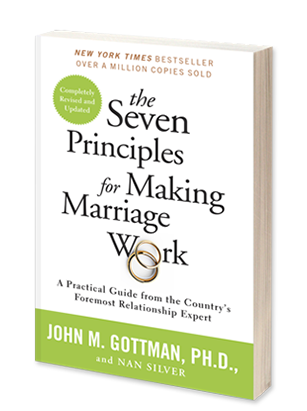"Our capacity to love a spouse deeply and our ability to experience great JOY in marriage are [in proportion] with the degree to which we are willing to suffer and hurt, to labor and toil, and to persevere through moments of unhappiness, stress, disappointment, and tests of our patience and love for our partners."
-Kent Brooks of the BYU faculty of Church History and Doctrine
Dr. John Gottman and Nan Silver reveal in their book, The Seven Principles for Making Marriage Work, the nature of marital conflict. Basically, there are two types of conflict: perpetual and solvable. Perpetual conflicts are those squabbles that seem to never get resolved such as: she wants a baby right away, but he feels he is not ready yet, and he wants decisions made quickly, but she's more methodical and doesn't like to be rushed. These fights tend to have underlying issues such as desired marital expectations, lack of trust, unfulfilled dreams, or selfishness. Sixty-nine percent of all marital conflict falls into this category (Gottman & Silver, 2013 p. 138).
Solvable problems are the situational problems that do not have any underlying conflicts that fuel it. Examples of this might be that a couple is having an issue trying to figure out how to settle into a morning routine or one of you just tracked mud on the clean, white carpet and the other spouse is upset over it. The process of figuring out conflicts like these can take a while and even lead to hurt feelings, but the issue does not yet have the underlying issues that are part of perpetual conflicts. However, these arguments can turn into perpetual conflicts if the couple does not have the tools they need to resolve these conflicts peaceably.
"Despite what many therapists will tell you, you don't have to resolve your major marital conflicts for your marriage to thrive."
-Dr. John Gottman
Perpetual problems can result in what Gottman and Silver call gridlock. Gridlock is a serious form of perpetual conflict. These are its characteristics:
- The conflict makes your feel rejected by your spouse.
- You can't make headway on the argument no matter how many times you discuss it.
- You become subbornly firm in your stances and will not give way for compromise.
- Feelings get hurt worse after each time the subject is brought up.
- You express no humor or affection during the fight.
- You vilify each other.
- You eventually disengage from your spouse on an emotional level.
(list from Gottman & Silver, 2013. P. 141)
Some people may think that avoiding such issues will allow the conflict to burn itself out. However, conflicts rarely resolve themselves in such a manner--if ever. Gottman and Silver say that:
"Avoiding conflict leads to emotional disengagement. The couple's trust in each other declines as they become increasingly trapped in the negativity . . . [and they] are on the course toward leading parallel lives and inevitable loneliness--the death knell for any marriage" (p. 140).
Fortunately, there are ways to get out of gridlock, but we will go over those steps in a future post. You simply need to know the difference between a regular perpetual problem and gridlock for now. As for attitudes you need to handle both solvable and perpetual conflict, Gottman and Silver suggest the following:
- Realize that negative emotions are important. "Negative emotions hold important information about how to love each other better" (p. 157). By using the tools we have already discussed in prior posts in this blog will help you to know how to express negative emotions without hurting your spouse or being offended by their negative emotions.
- Accept that neither partner is absolutely in the right when it comes to marital conflict. There are only perceptions and intentions. If you accept this as a truth, you will be more
 |
| Photo Link: |
willing to listen to one another and, hopefully, be able to figure out how to compromise in a way that is helpful to both of you.
- Accept and respect your
spouse. "When people feel criticized, disliked, or unappreciated, they are unable to change. Instead, they feel under siege, and they [become inflexible]" (p. 157). Remember, never criticize your spouse's personality. Dr. H. Wallace Goddard mentions that we should try to focus on treating our spouse (indeed, anyone) as though they are your honored guests (Goddard, 2009, p. 161). Would you ever consider yelling at a guest leaving your home who forgot their umbrella that they were inconsiderate dolts who must expect you to remember everything for them because they are so inconsiderate? Of course not! So try to give your spouse the same kind of consideration you would give a guest you actually
want to speak to you again.
- Remember to focus on the things you admire or adore in your spouse. This will help you to keep from becoming critical of your spouse.
(List taken from Gottman & Silver, 2013, p. 157-159).
Dr. H. Wallace Goddard mentioned another attitude he adopted that is helpful to have in a marriage, especially during conflict. He decided to take the view that his marital covenants were a promise not only between his wife, Nancy, and God that they would be together forever, but that he promised God that he would always look for the good in Nancy. He promised God that no sacrifice would be too great to be forgiving of his spouse. He promised God that he "would be His partner in protecting, blessing, comforting, and saving Nancy's precious soul [emphasis added]." He takes the view that there is nothing he "will ever do that will be more important than blessing [his] covenant partner" (Goddard, 2009, p. 105).
If you are having diffuculties with any of these attitudes, it may be because you are having issues with forgiving your spouse for past differences. When you learn to forgive, it relieves both you and your spouse of the burden of bitterness (Gottman & Silver, 2013, p. 159).
When we consecrate our lives to building up our marriage, we are willing to hold nothing that is good from our spouse or from others, even forgiveness. We are also "willing to minister to a mixed-up spouse. We are willing to love a failing partner. We bless those that belittle us. We pray for those who have despitefully used us. Please note that no partner should have to tolerate physical violence! [emphasis added]" (Goddard, 2009, p. 105). If there is any abuse in your marriage, this is a problem that absolutley needs intervention from a trained therapist. Do not delay.
For typical marital conflicts, here are a few tools to help a disagreement to be a discussion and not a power struggle:
- Soften your start-up. Ladies tend to have a trouble with this
 |
| For larger image, click here. |
one (myself included). When introducing a discussion that have strong negative feelings attached to it, try to focus the your conversation start up on your own feelings and acknowledge a shared responsibility for whatever the situation is. Gottman and Silver say that a soft start-up has four parts: "(1) 'I share some responsibility for this . . .' (2) 'Here's how I feel . . . (3) about a specific situation and . . . (4) here's what I need . . .' (positive need, not what you don't need)" (Gottman & Silver, 2013, p. 165). This makes sure that you are pointing the finger at yourself and comes across as a complaint or a plea for a favor, which is easier for our men to handle.
- Learn to make and receive repair attempts. Take breaks
when you feel any anger that might be threatening to cause you to shut down and stonewall (Gottman points out that if your heart rate rises above 100 beats per minute, your'e too angry to discuss things rationally, so take a break for at least 20 minutes to calm down). Accept apologies from your spouse and make apologies to your spouse (no sarcasm, please). Admit wrongdoing. Maintain a sense of humor. Say, "Maybe we should talk to each other in a different way." Be affectionate, even when disagreeing. Use soft teasing (the kind that actually illicits a laugh and does not belittle or demean anyone). Asking for a do-over; "Can we try this whole conversation again from the beginning?" Lastly, (I cannot emphasize this one enough) express appreciation. It is a confidence-builder. Gottman and Silver made a list of phrases that you can use for making repair attempts. They suggest that you make a copy of the list to hang on your fridge. Practice these phrases until they feel natural to you (p. 175). Link: Gottman Repair Checklist
- Sooth yourself and each other. Remember the 20 minute break I mentioned before?
Gottman suggests using deep breathing and muscle relaxation techniques to help you relax when feeling agitated. To sooth your spouse, you can offer a back rub or to talk them through the deep breathing and relaxation techniques.
- Compromise. First, find common ground by allowing each spouse to consider solutions to the problem. Once you are both ready with your solutions, allow one partner to discuss their ideas without interruption, then allow the other partner the same courtesy. Find what solutions you both came up with that are similar and discuss them. You can work your way outward from there.
(list taken from Gottman & Silver, 2013, p. 162-187).
Taking time to learn how to argue constructively will be a blessing to you, to your spouse, and to your marriage. Practice the techniques you see here. Don't forget to print out the Gottman Repair Checklist and put it on the fridge to help you learn to use and identify repair attempts made during your arguments. They will help to diffuse any anger that might be building up, which makes it difficult, if not impossible, to compromise effectively. Lastly, remember to be forgiving. Your spouse may not be perfect, but neither are you, but that doesn't have to come between you. Mercy is a wonderful healer as is a sense of gratitude. They are your balms of Gilead. Use them well.
References:
Goddard, H.W., PhD (2009). Drawing heaven into your marriage. Cedar Hills, UT: Joymap Publishing.
Gottman, J.M., PhD, & Silver, N. (2015). The seven principles for making marriage work. New York: Harmony Books.
















No comments:
Post a Comment